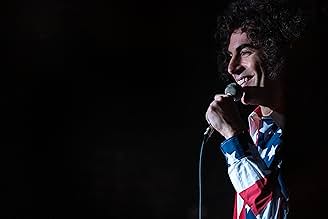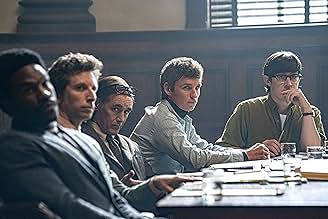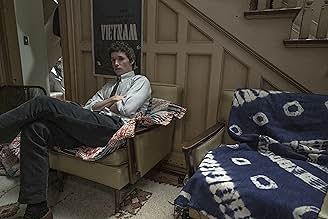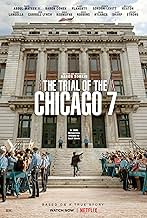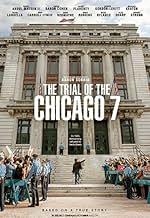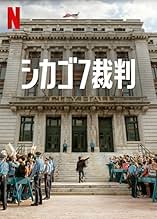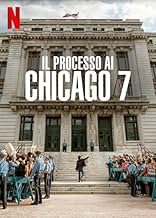En 1969, el gobierno federal acusó a siete personas de conspiración por las protestas en la Convención Nacional Demócrata de 1968 en Chicago.En 1969, el gobierno federal acusó a siete personas de conspiración por las protestas en la Convención Nacional Demócrata de 1968 en Chicago.En 1969, el gobierno federal acusó a siete personas de conspiración por las protestas en la Convención Nacional Demócrata de 1968 en Chicago.
- Dirección
- Guionista
- Elenco
- Nominado a 6 premios Óscar
- 58 premios ganados y 192 nominaciones en total
- Dirección
- Guionista
- Todo el elenco y el equipo
- Producción, taquilla y más en IMDbPro
Argumento
¿Sabías que…?
- TriviaSacha Baron Cohen admitted he was "terrified" of having to do an American accent for the film. He had used a few different variations of the accent before for comedic reasons, but never for a dramatic role. He knew the real Abbie Hoffman had a unique voice, having a Massachusetts accent but also having gone to school in California, and was worried he would "sound wrong". Aaron Sorkin had to reassure him that the role was "not an impersonation, but an interpretation", which Baron Cohen claimed did not help much.
- ErroresAt the start of the trial, Bobby Seale claims that the eight defendants are called the "Chicago Seven". In reality, they were originally called the "Chicago Eight". The defendants became known as the Chicago Seven after Seale was severed from the case.
- Citas
Judge Julius Hoffman: And the record should reflect, that defendant Hoffman and I are not related.
Abbie Hoffman: [sarcastic] Father, no!
Judge Julius Hoffman: [bangs his gavel] Mr. Hoffman, are you familiar with contempt of court?
Abbie Hoffman: It's practically a religion for me, sir.
- Bandas sonorasTruly, Truly, True
Written by Wayne Carson Thompson (as Wayne Thompson)
Performed by Jon & Robin
Courtesy of Sundazed Music
Opinión destacada
Legal historians and courtroom drama fans will have a field day with this Aaron Sorkin film which depicts the trial of eight radical protesters who made a name for themselves in Chicago during the 1968 Democratic National Convention. A disparate array of left-wing activists who took it upon themselves to demand an end to the Vietnam War instead became involved in the ghastly legal aftermath of the riots and thus faced criminal charges for allegedly instigating the violence. This film portrays the sham trial that took place.
Jospeh Gordon-Levitt, who has not been in anything good for a long time, is solid as the lead federal prosecutor who reluctantly takes on the assignment of trying to put the radical protesters behind bars. Mark Rylance's modest, down-to-earth demeanor makes him a rather peculiar fit to portray defense attorney William Kuntsler, the famous defense attorney well-known for his outspoken courtroom oratory and publicity hound antics. Frank Langella is flawless as Julius Hoffman, the judge who presided over this trial and whose combustible temper and tenuous mental faculties made him a ready target for ridicule from many, including those involved in the case. Edie Redmayne is excellent as Tom Hayden, the more pragmatic but equally passionate protester and defendant. Sacha Baron Cohen and Jeremy Strong are both stellar as defendants Abbie Hoffman and Jerry Rubin, respectively. Finally, Yahya Abdul Mateen II is eloquent as Bobby Seale, a Black Panther Party co-founder and the lone African-American defendant in the case.
There are discreet details about the trial I was hoping the film would cover. There is no mention of Bobby Seale's many colorful nicknames he assigned to the judge. It mentions the poet Alan Ginsberg only as a fellow protester, when in fact he was also called as one of several celebrity witnesses. So was the musician Judy Collins who began singing an anti-war song during her testimony. These, however, are minor oversights because the fundamental essence of this circus of a trial is effectively captured in the film. Unlike much of Sorkin's earlier work, the dialogue in this film is less grandiose and more straightforward. There are less pyrotechnics and more re-creation here. I mean that as a compliment. It's the perfect portrayal of a trial which turned out to be a low point in the history of American jurisprudence. It also expertly captures the schism within the American left and how the idealists and pragmatists often locked horns even back in the 1960s. Gripping, frightening and instructive in today's world, it is not to be missed. Highly recommended to all.
Jospeh Gordon-Levitt, who has not been in anything good for a long time, is solid as the lead federal prosecutor who reluctantly takes on the assignment of trying to put the radical protesters behind bars. Mark Rylance's modest, down-to-earth demeanor makes him a rather peculiar fit to portray defense attorney William Kuntsler, the famous defense attorney well-known for his outspoken courtroom oratory and publicity hound antics. Frank Langella is flawless as Julius Hoffman, the judge who presided over this trial and whose combustible temper and tenuous mental faculties made him a ready target for ridicule from many, including those involved in the case. Edie Redmayne is excellent as Tom Hayden, the more pragmatic but equally passionate protester and defendant. Sacha Baron Cohen and Jeremy Strong are both stellar as defendants Abbie Hoffman and Jerry Rubin, respectively. Finally, Yahya Abdul Mateen II is eloquent as Bobby Seale, a Black Panther Party co-founder and the lone African-American defendant in the case.
There are discreet details about the trial I was hoping the film would cover. There is no mention of Bobby Seale's many colorful nicknames he assigned to the judge. It mentions the poet Alan Ginsberg only as a fellow protester, when in fact he was also called as one of several celebrity witnesses. So was the musician Judy Collins who began singing an anti-war song during her testimony. These, however, are minor oversights because the fundamental essence of this circus of a trial is effectively captured in the film. Unlike much of Sorkin's earlier work, the dialogue in this film is less grandiose and more straightforward. There are less pyrotechnics and more re-creation here. I mean that as a compliment. It's the perfect portrayal of a trial which turned out to be a low point in the history of American jurisprudence. It also expertly captures the schism within the American left and how the idealists and pragmatists often locked horns even back in the 1960s. Gripping, frightening and instructive in today's world, it is not to be missed. Highly recommended to all.
- PotassiumMan
- 8 oct 2020
- Enlace permanente
Selecciones populares
Inicia sesión para calificar y agrega a la lista de videos para obtener recomendaciones personalizadas
- How long is The Trial of the Chicago 7?Con tecnología de Alexa
Detalles
- Fecha de lanzamiento
- Países de origen
- Sitio oficial
- Idiomas
- También se conoce como
- The Trial of the Chicago 7
- Locaciones de filmación
- Productoras
- Ver más créditos de la compañía en IMDbPro
Taquilla
- Presupuesto
- USD 35,000,000 (estimado)
- Tiempo de ejecución2 horas 9 minutos
- Color
- Mezcla de sonido
- Relación de aspecto
- 2.39 : 1
Contribuir a esta página
Sugiere una edición o agrega el contenido que falta







